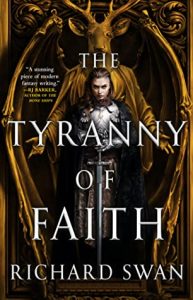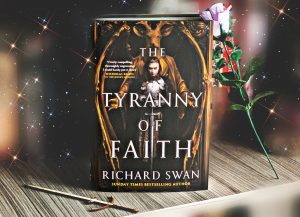THE TYRANNY OF FAITH by Richard Swan (BOOK REVIEW)
This review may contain minor spoilers for the first book, The Justice of Kings.
“Stupidity loves company, whilst wisdom must prepare for a lifetime of solitude.”
 In the aftermath of The Battle at Galen’s Vale, Sir Konrad Vonvalt, Helena, Bressinger and Sir Radomir journey to Sova, the capital of the empire. The Emperor must be warned of the threat Bartholomew Claver poses should he gain further access to the Draedist Arcana, for the authority of the Magistratum is at stake as is the downfall of the Sovan Empire. Once they enter the city they soon discover ripples of rebellion, the streets are filled with fanatics declaring notions of Holy vengeance, the nobility openly speak ill of the Emperor and inside the Magistratum traitors lurk. Immediately the Emperor tasks Konrad Vonvalt in rooting out these traitors and identifying those who have been supporting Claver. Just as Konrad discovers the truly horrifying powers Claver now wields, a member of the Emperor’s family is kidnapped and much to Konrad’s annoyance he must abandon his pursuit of Claver and orchestrate a rescue mission. Yet with Konrad’s health waning and with thickening plots pulling our characters in several directions the story takes a terrifying turn.
In the aftermath of The Battle at Galen’s Vale, Sir Konrad Vonvalt, Helena, Bressinger and Sir Radomir journey to Sova, the capital of the empire. The Emperor must be warned of the threat Bartholomew Claver poses should he gain further access to the Draedist Arcana, for the authority of the Magistratum is at stake as is the downfall of the Sovan Empire. Once they enter the city they soon discover ripples of rebellion, the streets are filled with fanatics declaring notions of Holy vengeance, the nobility openly speak ill of the Emperor and inside the Magistratum traitors lurk. Immediately the Emperor tasks Konrad Vonvalt in rooting out these traitors and identifying those who have been supporting Claver. Just as Konrad discovers the truly horrifying powers Claver now wields, a member of the Emperor’s family is kidnapped and much to Konrad’s annoyance he must abandon his pursuit of Claver and orchestrate a rescue mission. Yet with Konrad’s health waning and with thickening plots pulling our characters in several directions the story takes a terrifying turn.
The Tyranny of Faith by Richard Swan is simply a masterful sequel to The Justice of Kings. Filled with political intrigue, religion, law, philosophy and necromancy this is a richly layered medieval fantasy that’s both familiar and refreshing.
Once again the novel is written through Helena Sandaka’s first person narration as she writes an account of her time with Konrad Vonvalt. Yet now she is more than just his clerk, she is his trainee apprentice. Immediately we fall into a comfortable dynamic between these characters after watching their closeness develop in the first book. Helena still casts a judgeful eye over Vonvalt’s actions, and Vonvalt still acts as Helena’s tutor, teaching her to hone her skills in his art. Bressinger is ever the protector even with the loss of his arm, and Sir Radomir who joined the band in Galen Vale, becomes much more than just our comedic relief, although he still fulfills that role. Though tensions run high between them, these four characters also illustrate their close bond, which of course I loved. We are also introduced to new characters, most notably the Emperor, who was rather different from the kind of character I had initially expected, despite his stubborn demeanour, I actually found myself liking him.
“Now you see, Helena. I have never been some paragon of virtue, a rigid stickler to every law and by-law of the Empire. l am exactly what my title is: justice, no more and no less.”
We spend a large majority of the beginning chapters in Sova and I loved Swan’s use of juxtaposing images. When Helena first glances upon Sova she describes it as a mesmerising place, vividly colourful with art and culture, a bustling place where every race of people were to be found. However, as Helena looks behind the curtain, when she gets inside the Emperor’s palace, she witnesses corruption in all its forms. Previously it became apparent that Vonvalt had become lapsed in the lawful and moral codes he was sworn to abide by, but as the nests of lies and deceit unravel and the Emperor asks Vonvalt to enact new decrees, we see those codes horrifically breaking. As beheadings and gruesome executions mount, as many are sent to be tortured to confess and disposed of without trial, Helena’s viewpoint of Vonvalt and the Sovan Empire shifts. For what was the point of the war, the bloodshed and the lives lost if they couldn’t maintain the law and order the Emperor himself had fought to establish? Yet in this book Vonvalt’s attention is being pulled in several directions, even when his temper flares and more often than not he loses complete control, it is easy to see why he makes the decisions he does. Helena may be rightful in her critical judgment, but she also shows her naivety. Something which she reflects upon time and time again in her account.
This reflection is significant throughout and I love the way Swan balances politics, law and philosophy with thought-provoking depth. Can the rights and wrongs of rulership, power, vengeance, and even the deeds of the entities in the afterlife be fairly judged when only looking at it from one perspective? What of emotions, personal morals and instincts? This was something I particularly enjoyed pondering over. It also cleverly works to build character growth, as Helena learns to accept that not every action will be just and people have their reasons. Once again Helena and Vonvalt’s characters work like scales, weighing their deeds and their faults.
“Perhaps, reader, you see me as dogmatic in my own way.
Perhaps I am too idealistic, or I certainly was, expecting the law and morality and ethics to marry perfectly. But I was not so self-righteous to think that the life of one man, ten, or even a hundred were more important than a hundred million. After all, people died all the time, for a variety of reasons and injustices. But to me that meant the deaths we could control, the killings we could prevent, were all the more important.”
When I read The Justice of Kings, although I thoroughly enjoyed the murder mystery narrative, I was left wanting more depth and exploration of the magical abilities used by Justices. Well Swan certainly remedies that in this book because a prominent strength in The Tyranny of Faith is how it expands upon our knowledge of necromancy. We learn through the history of the world that a ‘magickal cataclysm’ first brought about arcane powers, as when the mortal plane and the holy dimensions unified it opened a gateway between the realms, meaning energies from the afterlife could be tapped into. I found this thoroughly fascinating, but Swan doesn’t just stop here. As we head towards the climax of this novel we witness exactly what necromancy can achieve in wrong or inexperienced hands and I have to say these scenes were absolutely incredible. If not more than a little terrifying.
“My chest hurt where my heart pulsed and squirmed painfully, stressed to exhaustion, moments from giving out.
The entity opened its mouth parts, its disjointed maw a huge void filled with teeth like daggers. It made a sound that I simply cannot describe.”
Swan is an author who consistently knows how to deliver an edge-of-your-seat ending, an ending where all hell breaks loose and in this book that’s quite literally. I simultaneously cannot wait and fear for the third and final instalment in this trilogy, which will see Helena Sedanka bring her account of Konrad Vonvalt to an end.
ARC provided by Nazia at Orbit Books in exchange for an honest review. Thank you for the copy!
The Tyranny of Faith is out now!


[…] Want some murder mystery? Nils at the Fantasy Hive calls Richard Swan’s The Tyranny of Faith “a masterful sequel&#… […]